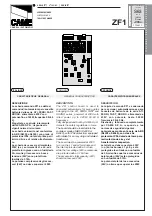
Standard Components
Operation
The Modulating Float Control Valve with Pressure Sustaining Fea-
ture is designed to automatically maintain a constant liquid level in
a tank or reservoir. It is controlled by a remote mounted Modulating
Float Pilot designed to: 1) Modulate Open (allowing fluid out of the
main valve cover chamber) when reservoir level decreases, and, 2)
Modulate Closed (allowing fluid to fill the main valve cover cham-
ber) when reservoir level increases. A decrease in reservoir level
causes the valve to modulate towards an open position, allowing
reservoir level to increase. An increase in reservoir level causes the
valve to modulate towards a closed position, allowing reservoir
level to decrease.
The normally closed sustaining pilot remains open when upstream
pressure is above the adjustable setpoint, and modulates toward
a closed position if upstream pressure falls below the setpoint.
As the sustaining pilot closes, fluid is directed into the main valve
cover chamber, allowing the valve to modulate toward a closed
position, raising upstream pressure. Normal level control operation
resumes when upstream pressure is above the sustaining pilot
setpoint.
If desired, the float modulating action of the valve can be "re-
versed" by inverting or "reversing" the action of the Modulating
Float Pilot. The Modulating Float Control is remotely mounted from
the valve, and field connected with 3/8" minimum copper tubing in
accordance with factory piping schematic.
1
X
Y/FC
P/L
X
3
4
2
CLOSES VALVE
OPENS VALVE
FLOW
(AOS)
1. Prior to installation, flush line to remove debris.
2. Install valve so the flow arrow matches flow through the line, and gauges to monitor valve inlet and outlet pressures. A Position
Indicator can be installed to provide visual indication of valve position and operation without disassembly.
3. Install isolation valves upstream and downstream of the main valve.
4. Provide adequate clearance for valve servicing and maintenance. Refer to valve servicing dimensions on next page. Avoid installing
valves 6" and larger in the vertical position (main valve stem horizontal). Automatic Control Valves (ACVs) are designed for horizon-
tal in-line installation, with the cover facing up (main valve stem vertical). Slow operation or premature stem and guide wear may
occur if valve is not installed according to factory recommendations. Consult factory for detailed engineering review prior to order-
ing if valve is to be installed other than horizontally in-line.
5. If valve is equipped with a pilot control system, extra precautions should be made during installation to protect the piping circuit
from damage. Only remove the pilot control system from the valve if necessary. Tubing and fittings should be kept clean and
replaced exactly as removed. Consult appropriate hydraulic schematic to ensure proper re-assembly.
6. Install float control onto tank and connect lines to valve per schematic.
7. Adjust float arm to the high-level setting – the float pilot should be closed.
Start-up of an automatic control valve requires that proper procedures be followed. Time must be allowed for the valve to react to
adjustments and the system to stabilize. The objective is to bring the valve into service in a controlled manner to protect the system
from damaging over-pressure.
1 – Main Valve (905GD – Single Chamber)
2 – Modulating Float Control
3 – Pressure Sustaining Control
4 – Adjustable Closing Speed
X – Isolation Cocks
Installation
979GD-20 (Globe) Modulating Float Control Valve with Pressure
Sustaining Feature
2 IOM-A-ACV-979-20_679-20 2115
EDP# 1917116
© 2021 Watts






























